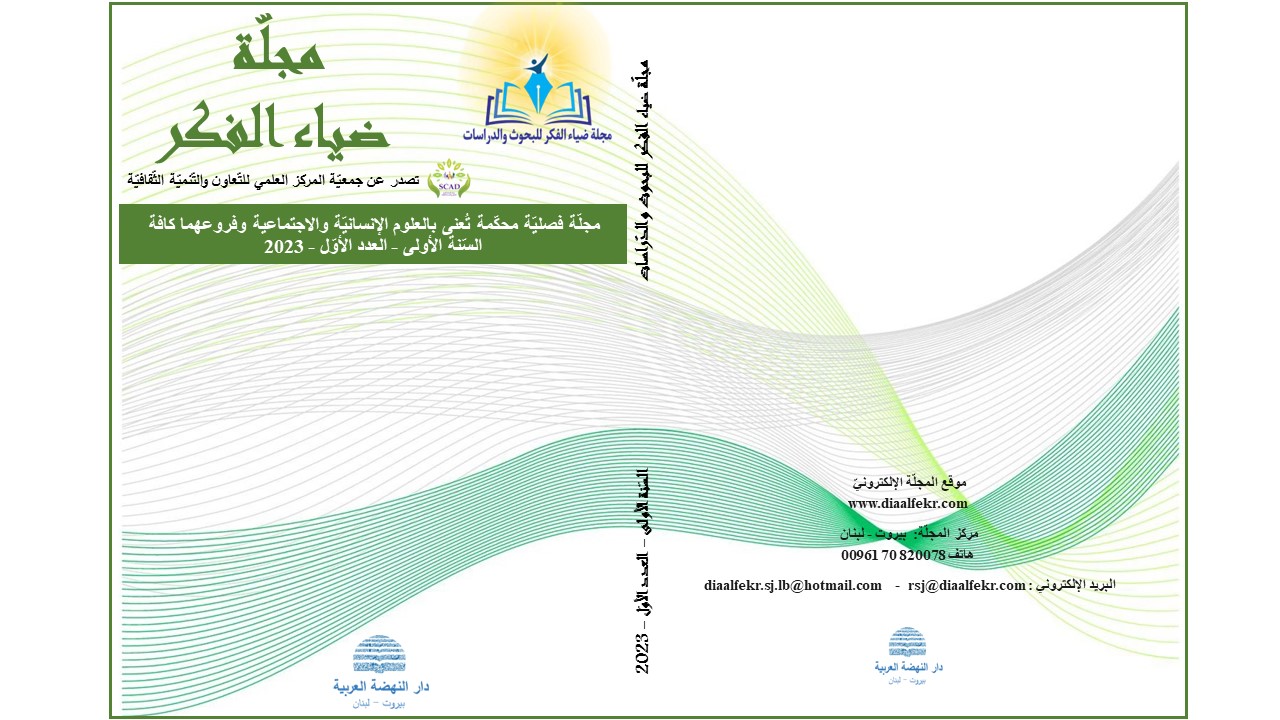مجلة ضياء الفكر

الإدمان الكحولي للآباء وتأثيره في الأمن النّفسّيّ لدى الأبناء المراهقين
شهرزاد خضر نبّوه
مجلة ضياء الفكر للبحوث والدراسات
العدد الأول
ص ص 94 – 112
الملخص:
هدفت هذه الدّراسة الى الكشف عن تأثير الإدمان الكحولي للآباء في الأمن النّفسّيّ لدى الأبناء المراهقين. تألّفت عينة الدّراسة من (30) مشاركًا تمّ إختيارهم بطريقة العيّنة القصديّة: عشرة آباء مدمنين طُبق معهم اختبار تحديد اضطرابات استعمال الكحول وعشرة من أبنائهم المراهقين موزّعين مناصفةً بين الجنسين، يقابلهم عشرة مراهقين لآباء غير مدمنين، وتراوحت أعمار المراهقين من المجموعتين بين (14 و 18) سنة. أُجريت معهم مقابلات عياديّة بالإضافة إلى تطبيق رائز تبصّر المتون ومقياس الأمن النّفسّيّ. اعتمدت الدّراسة منهج البحث النّوعيّ الكمّيّ القائم على دراسة الحالات دراسة عياديّة نفسّيّة مؤلّفة من عدّة جلسات، وللتّأكد من صحّة الفرضيّات تمّ استخدام المنهج الإحصائيّ الوصفيّ. توصّلت نتائج الدّراسة إلى وجود علاقة عكسيّة دالّة إحصائيًّا بين الإدمان الكحوليّ للآباء وأبعاد الأمن النّفسّيّ لدى الأبناء المراهقين، فكلّما إرتفع معدّل تعاطي الأبّ للكحول انخفض مستوى الأمن النّفسّيّ لدى ابنه المراهق. كما بيّنت وجود فروق دالّة إحصائيًّا في درجة الأمن النّفسّيّ بين أبناء الآباء المدمنين مقارنةً بأبناء الآباء غير المدمنين. وأشارت النّتائج إلى وجود فروق دالّة إحصائيًّا في مشاعر التّجاذب الوجدانيّ والانتماء الاجتماعيّ والمزاجيّة لدى أبناء الآباء المدمنين مقارنةً بمشاعر أبناء الآباء غير المدمنين. كما أظهرت وجود فروق دالّة إحصائيًّا في مستوى الأمن النّفسّيّ بين الذّكور والإناث المراهقين الذّين ينتمون إلى آباء مدمنين لصالح الإناث.
الكلمات المفتاحيّة: الإدمان الكحولي، الأمن النّفسّيّ، المراهقين.
Alcoholism of parents and its impact on the psychological security of teenage children
Shahrazad Khodor Nabbouh
Issue (1)
p.p. 94 – 112
Abstract:1
This study aimed to reveal the impact of parents’ alcoholism on the psychological security of teenage children. The study sample consisted of (30) participants who were selected using a purposive sampling method: ten addicted fathers of which have been subjected to Alcohol Consumption Resulting Disorders Test (AUDIT), and ten of their teenage children, distributed equally between the sexes, compared to ten adolescents with non-addicted fathers. The ages of the adolescents from the two groups ranged between (14 and 18) year. Clinical interviews were conducted with them, in addition to the Thematic Apperception Test (TAT) and the psychological security scale. The study adopted a quantitative qualitative research approach based on case studies, a psychological clinical study consisting of several sessions, and to ensure the validity of the hypotheses, a descriptive statistical approach was used. The results of the study revealed that there is a statistically significant inverse relationship between fathers’ alcoholism and the dimensions of psychological security among teenage children. The higher the father’s rate of alcohol abuse, the lower the level of psychological security among his teenage son. It also showed that there are statistically significant differences in the degree of psychological security among children of addicted parents compared to children of non-addicted parents. The results indicated that there were statistically significant differences in the feelings of emotional attraction, social belonging, and mood among children of addicted parents compared to the feelings of children of non-addicted parents. It also showed that there are statistically significant differences in the level of psychological security between teenage males and females who have addicted parents in favor of females.
Keywords: alcohol addiction, psychological security, adolescents.


